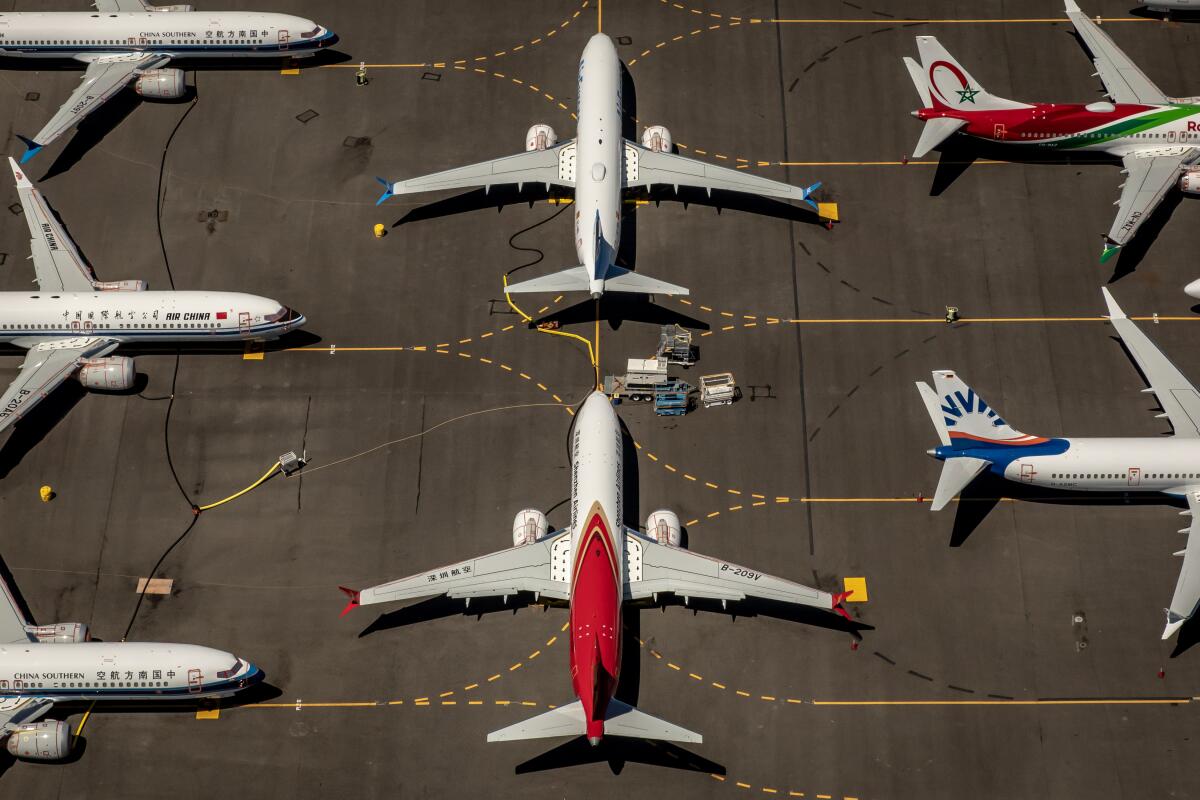Boeing burns $1 billion in cash waiting for its 737 Max to resume flying

- Share via
Boeing Co. burned $1 billion in cash during the second quarter, a sign of the strain from a protracted grounding of the 737 Max jetliner that followed two fatal crashes.
Investors are studying the performance to gauge how badly the company will be hurt if the Max crisis extends late into the year or beyond. Analysts had anticipated an even greater drain for the first full quarter of operations since commercial Max flights were halted in March: an average $2-billion outflow. A year earlier, Boeing generated $4.3 billion in free cash flow.
“It could have been worse,” Robert Stallard, an analyst with Vertical Research Partners, said in a note to clients Wednesday. “Although the headline numbers for 2Q look pretty grim, they are not as bad as we had been forecasting.”
Meanwhile, Boeing Chief Executive Dennis Muilenburg said the company will consider slowing or even temporarily halting production of the 737 Max if a global flying ban drags on longer than anticipated.
The plane maker’s best estimate is that it will submit software updates and paperwork for the Max by September to the Federal Aviation Administration, followed weeks later by approval to resume passenger flights. Regulators in the U.S., Europe, Canada and other nations are reviewing an update for software linked to the crashes, as well as possible changes to pilot training and other aspects of the Max. But Muilenburg cautioned that Boeing can’t foot the costs of building and storing undelivered aircraft indefinitely.
The total bill for Boeing stands at $8.3 billion, and counting, as the global grounding for its top-selling aircraft extends into a fifth month. The manufacturer continues to churn out 42 single-aisle 737 jets a month to dull the blow to suppliers. Since airlines and lessors can’t take delivery of Max planes with the flying ban in place, payments to Boeing have dropped while the company absorbs the expense of storing about 150 newly built aircraft.
Boeing shares ended the day down 3.1% at $361.43. Through Tuesday, Boeing had slid 12% since an Ethiopian Airlines 737 Max 8 plunged into a field March 10, prompting regulators to ground the jet globally. That was the biggest decline on the Dow.
Sales in the quarter plunged 35%, to $15.8 billion. Analysts had predicted $20.4 billion. Inventory, already at a record $65.4 billion in the first quarter, soared to $68.5 billion. Its net loss was $2.9 billion.
Boeing disclosed some bad news on another front: a possible slip in deliveries of the 777X, the upgraded version of its behemoth wide-body jet. “Engine challenges” are delaying the first flight to early next year, Boeing said in a statement as it reported earnings. And while the company said it’s still targeting late 2020 for the first delivery, it warned that “there is significant risk to this schedule” because of the engine issues.
The latest delay for Boeing’s first new jetliner since the 737 Max is not “going to surprise a lot of people, but this means entry to service is pushed at least to 2021,” Ken Herbert, an analyst with Canaccord Genuity, said by phone.
Boeing revealed last week that it would record a $5.6-billion pretax charge to compensate airlines and lessors of the 737 Max, outlining for the first time costs that could linger for years in the form of discounts on future jet orders, spare parts and services. The Chicago-based company also added $1.7 billion in extra 737 production cost, bringing the total drag against future profit from disrupted Max output to $2.7 billion.
The accounting charge clipped $8.74 a share from earnings. Boeing swung to a core loss of $5.82 a share, according to a company statement. Analysts had expected a profit of $1.98 a share, according to the average of analyst estimates compiled by Bloomberg. The charge didn’t appear to be fully reflected in expectations.
There’s never been an indefinite halt to commercial flights ordered for an airplane as significant to airlines and Boeing as the 737 Max, which has a backlog of 4,415 unfilled orders.
The industrial giant’s sprawling operations and low debt leverage have helped shield it from the grounding’s effects. Boeing was bolstered by improved profitability for another source of cash, the 787 Dreamliner. Deferred production costs for the Dreamliner fell $1.06 billion, to $21 billion, in the quarter, the company said on its website.
While revenue and profit plunged for Boeing’s commercial airplane business because of the Max, the other divisions were solidly profitable with mid-teens profit margins targeted by Muilenburg.
Earnings from operations more than doubled to $975 million for Boeing’s defense unit, which reported an operating margin of almost 15%. Profit at the global-services business climbed 14% to $687 million while margins edged above 15%.
Moody’s Investors Service and Fitch Ratings revised Boeing’s credit outlook to negative on July 22 while affirming the company’s rating at the sixth-highest level of investment grade.
“Fitch believes Boeing’s credit profile can support the current 737 Max stresses due to substantial liquidity, financial flexibility, low leverage, access to the capital markets, and revenue diversification,” the ratings company said.
More to Read
Inside the business of entertainment
The Wide Shot brings you news, analysis and insights on everything from streaming wars to production — and what it all means for the future.
You may occasionally receive promotional content from the Los Angeles Times.










